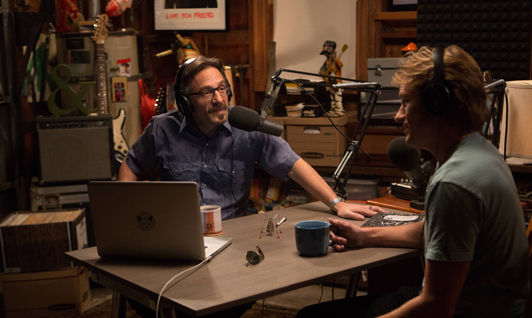The comedian/cat collector/Bob Newhart fanboy talks to InsideHook about his new IFC show Maron and having his first career moment at 49.
“A few years ago I thought about killing myself in my garage. Now I’m doing the best thing I’ve ever done in my life … in that garage.”
Welcome to the topsy-turvy life of Marc Maron, comedian. Louis C.K. calls him “truly one of the greatest of all time.”
Never heard of him? You’re about to. After 49 years, one expensive divorce, one lost job and one unexpectedly successful podcast taped in his garage, he’s finally having a career moment.
This week, Maron releases his first memoir (Attempting Normal) and stars in the darkly funny IFC series Maron — a show that leads off with the above suicidal rant, delivered while the star is hitting on a veterinarian, diarrhea-laden cat in tow.
We spoke with the comedian about his late-found success, his weird obsession with sickly cats and how to turn embarrassingly personal agony into great success.
Your show is dark. How much of it is real?
It’s a mix. The emotions and reactions are 80-90 percent real. And the situations can be: I did confront an Internet troll, but I didn’t do it during a Dungeons and Dragons game. There was a possum under my house, but Dennis Leary didn’t bust my balls for my inability to take care of it. My dad does not live in a motor home. But emotionally, yeah, it’s just an amplified version of my life.
This is kind of your first time doing a series. Why now?
I never really pursued it [Editor’s note: that said, you must read Maron’s account of his failed audition for Saturday Night Live] or I didn’t have the right representation. But I’m comfortable with acting.
You talk enough about it, and you get used to it. Being funny about it helps me detach, handle the emotions of it. And it’s good: if I can talk about it, it means I have distance, and it’s not threatening to me.
Thankfully, you seem more well-adjusted in real life than on the show.
You don’t think I’m well adjusted on there? (Laughs.) I don’t know, it’s pretty close to who I am.
Well you do call yourself a “feral cat wrangler.”
I grew up with a lot of dogs, but then someone gave me a cat. Then I rescued a few of them. I find them interesting. They’re not needy, and do things on their own terms. They have unique personalities. I like the tension of cat ownership. They’re not immediately warm animals.
When you started your podcast, you had just lost your radio job at Air America and were going through a painful divorce. What were you feeling?
It was actually a dream of mine: to be able to talk alone on a mic. It’s an amazing skill, and only a few people (have it). Whatever you think of them, Rush Limbaugh, Randi Rhodes and Howard Stern do really well in their own ways. It just grew into this all-consuming thing.
On your podcast you’ve interviewed everyone from Dane Cook to David Cross to Robin Williams — and it can get pretty personal. Does anyone make you nervous?
I get apprehensive if I don’t know their work really well. Then I can only work off of their public persona. It drives me crazy with anticipation. But then I’m usually way off the mark and I find I can engage with them really well.
Anybody you’ve wanted to have on you weren’t able to?
Sure, plenty of people: Iggy Pop, Will Ferrell, Bob Newhart ….
Your book title: “Attempting Normal” … It seems that you wrote about failing to achieve that goal.
I accept that. There’s a misconception about what normal is. The best you can do is be comfortable with yourself and behave properly. Be OK with things.
Speaking about being OK with things, I have to ask: You seem like a nice Jewish boy. What’s with all the swearing?
I know, right? My grandmother would have said the same thing. I don’t have to do it, and I don’t when I do regular TV. But when I can, I seem to do it way too much.
This article was featured in the InsideHook newsletter. Sign up now.
